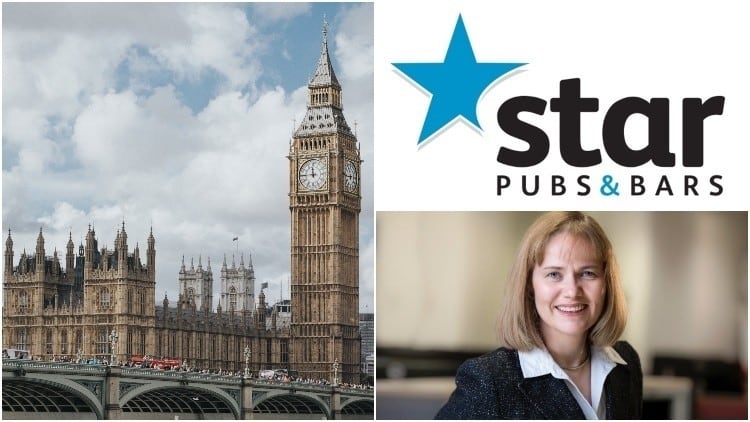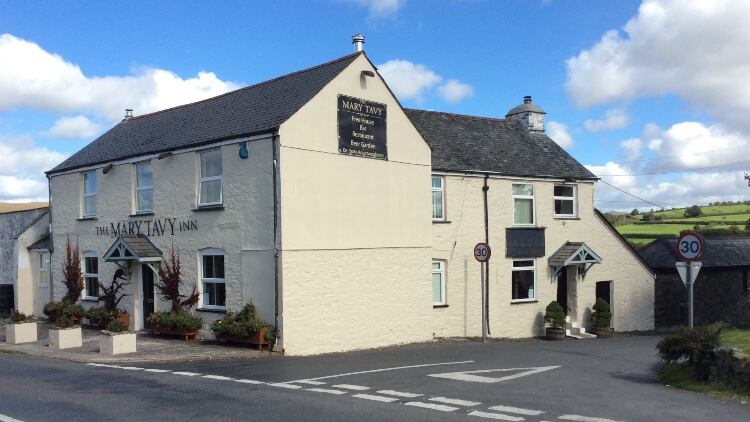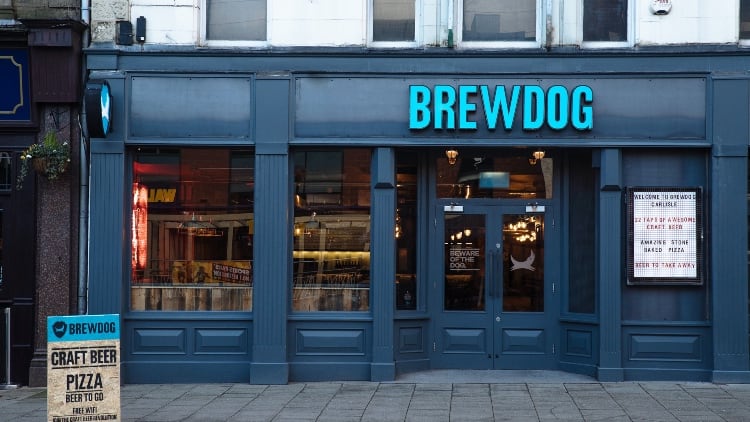Work underway at new 42 BrewDog sites
Unveiling an artist’s impression of a new site in Atlanta on Twitter, BrewDog co-founder James Watt revealed that the independent Scottish brewer and bar operator currently has 42 sites in its expansion pipeline.
“Others include Belfast, London, Paris, Vegas, Bath, Exeter, Mumbai, Sydney, Amsterdam, Berlin, Frankfurt, Gurgaon, Lyon, Milan, Chester, Durham, Hyderabad & Cleveland,” Watt added.
The announcement came after BrewDog chief executive officer David McDowall revealed that 28 sites were put into “hibernation” as a result of the Covid-19 pandemic.
The operator of more than 100 bars across 15 countries also recently revealed that it is hoping to transform a former industrial unit on the banks of the Thames into a new brewpub concept at London’s Wapping Power Station.
Operators reluctant to sell due to false ‘bottom of the market’ perception
According to Simon Hall, director at leisure property specialist Fleurets, the hospitality sector remains attractive to investors who recognise the “unbreakable spirit” of the industry and resilient customer demand – which have ensured Fleurets continues to see high levels of demand.
“Downloads of sales brochures over the last six months has averaged 1,200 per day, a like-for-like increase of 28% per property on the same period pre-Covid,” Hall explained.
“It is significant that this is not just people stuck at home browsing. Viewing numbers have increased as well. Viewings in the last five months have doubled from the previous six months and over the last six weeks has averaged 72 viewings per week, which reflects a 19% increase on the same six-week period before Covid.”
What’s more, Hall adds that there have been a number of notable high street restaurant units returning to landlords as part of CVA arrangements and administrations.
“These have by and large been snapped up by operators eager to expand and take advantage of landlords being happy to agree more flexible terms to minimise void periods,” he continued.
“However, the majority of operators are reluctant to sell at what is perceived to be, perhaps incorrectly given the strength of demand, the bottom of the market."
“This demand and supply imbalance is driving competitive situations,” he added. “We have had several contract races and many best and final bid situations. Sales prices are often at, or in excess of, this time last year. Vendors may consider market conditions and pricing to be more favourable than the wider economic indicators suggest.
“We anticipate demand to continue to strengthen as operators allow two to three months to purchase and refit a new acquisition, ready for opening in May. The increased ‘certainty’ provided by the road map will fuel this activity.”
Star withdraws RPI rent increase policy following PCA intervention
Heineken’s pub arm, Star Pubs and Bars, has retracted a policy stating RPI rent increases constitute a tenant rent assessment or review, according to an announcement by the industry regulator, according to reports by The Morning Advertiser (MA).
As outlined by the pubs code, tenants have the right to a code rent assessment proposal (RAP) if there has been no rent assessment during the previous five years.
However, according to an update on 18 February, pubs code adjudicator (PCA) Fiona Dickie revealed Star had refused to provide tenants with an RAP because, the operator argued, annual retail price index (RPI) rental increases during the previous five years counted as an assessment or a review.
The PCA added that Star had previously argued this point regarding pubs code rent events unsuccessfully during an arbitration and chose not to appeal the eventual award, despite having the option to do so.
While arbitration awards are not binding in future cases, the PCA expressed concern to Star’s code compliance officer (CCO) over its position, adding her belief that the company should have reconsidered it following the award.
In light of this intervention, the CCO confirmed that Star – which has offered more than £44m in rent reductions due to the Covid-19 pandemic thus far – changed its position, will no longer identify RPIs as code rent assessments or reviews and will inform tenants of the change.
A spokesperson from Star Pubs & Bars said: "We welcome the improved relationship with the PCA.
"They came to us in this instance with their concerns and we were able to resolve the issue to everyone's satisfaction."

Dartmoor pub sold off £495k asking price
Sixteenth century pub the Mary Tavy, a detached village inn occupying a prominent landmark trading position within Dartmoor National Park near Tavistock in Devon, has sold off an asking price of £495,000.
The business benefits from four high quality, self-contained ensuite letting bedrooms, a main bar catering for more than 28 covers, a lounge bar and restaurant able to host 52, as well as a commercial catering kitchen with ancillary facilities, as well as a four double bedroom family sized owner’s accommodation.
What’s more, the grounds feature a beer garden with moorland views, a customer car park and a private garden area.
“The freehold sale of the Mary Tavy inn represented an excellent opportunity to purchase an attractive and well-regarded country village inn and destination freehouse with letting bedrooms, in picturesque surroundings,” Mike Phillips, director of selling agents Stonesmith said.
“We received significant interest, and a sale was quickly concluded to private buyers.
“Even in these unprecedented times, there continues to be strong interest and demand for pubs and inns in the South West.”

Business rates review delayed until autumn
The Government’s final report on the fundamental review of businesses rates has been pushed back until the autumn.
The continuing impact of the coronavirus pandemic was blamed for the delay, though hopes remain that more clarity on the long-term state of the economy and public finances will be delivered later in the year.
The review was first announced by Chancellor of the Exchequer Rishi Sunak at last year’s Budget and a call for evidence followed in July 2020 in a bid to seek stakeholders’ views on key issues including reforming the rates multiplier and looking at alternative ways of taxing non-residential property.
The call for evidence closed last year and the Government is currently considering responses, it said.
- To find out more about pubs for sale, lease and tenancy visit our property site
ADVERTISEMENT
Opportunities through disruption in the pub and restaurant market
By Stuart Stares, associate director, Savills

The pubs and restaurants market has faced one of the most disruptive periods in recent times. With the reopening of the sector unlikely until at least April, many operators will have only operated for four months out of the past 12 months.
While distress in the pub sector has been reduced with lenders continuing to support operators, the restaurant sector has faced a far greater fall out with a number of operators completing CVAs and administrations such as Pizza Express and the Casual Dining Group.
While some of the larger restaurant chains have focused on rationalising their portfolio this has created opportunity for independent operators and investors, others have sought to be more innovative to increase and add value to their assets.
Within the pubs and restaurant market it has often been difficult for independent or smaller operators to compete with the expansion and appetite of the larger chains, especially for the best sites.
We are now seeing independent operators actively acquiring sites that rarely become available, are fully fitted and in many instances fall outside of the requirements for corporate operators.
These operators have proven to be more nimble and fast moving in adapting for change and we’ve seen operators successfully implement takeaway services during the first lockdown and then introduce or partner with food vans where pubs did not serve food to allow them to remain open.
They’ve also used the time where they had been closed to update and redecorate interiors, adopt technology to allow for ordering through apps, and update and utilise outdoor space for more efficient use.
This has all meant that independents had welcomed back customers in large numbers and remained popular until the latest lockdown.
However, the independent operators are not the only ones that have been interested in the sector. These sites have also attracted the attention of investors who are looking to repurpose these sites for alternative uses.
These investors are hunting for large sites with unused excess land and sites that could be changed in its entirety. We’ve seen a number of pubs and restaurants snapped up for ‘covid-proof’ operators such as drive-thrus, convenience stores, care or retirement home and day nurseries.
A good example is the former Chiquito in Shrewsbury, which offered great connectivity and space, that has been repurposed into a day nursery and is due to open later this year.
Additionally, while traditional high street lenders may have restricted their lending there remains a number of active lenders in the sector, which has not only supported investment into the sector but, given tenants the opportunity to acquire their freeholds. With record low interest rates tenants are seeing mortgage payments below previous rents and therefore there are savings to made.
The demand from alternative uses and from independent operators has supported the pricing in the sector, and as we see light at the end of the tunnel and an expected bumper summer, we anticipate healthy demand for pub and restaurant sites going forward.




